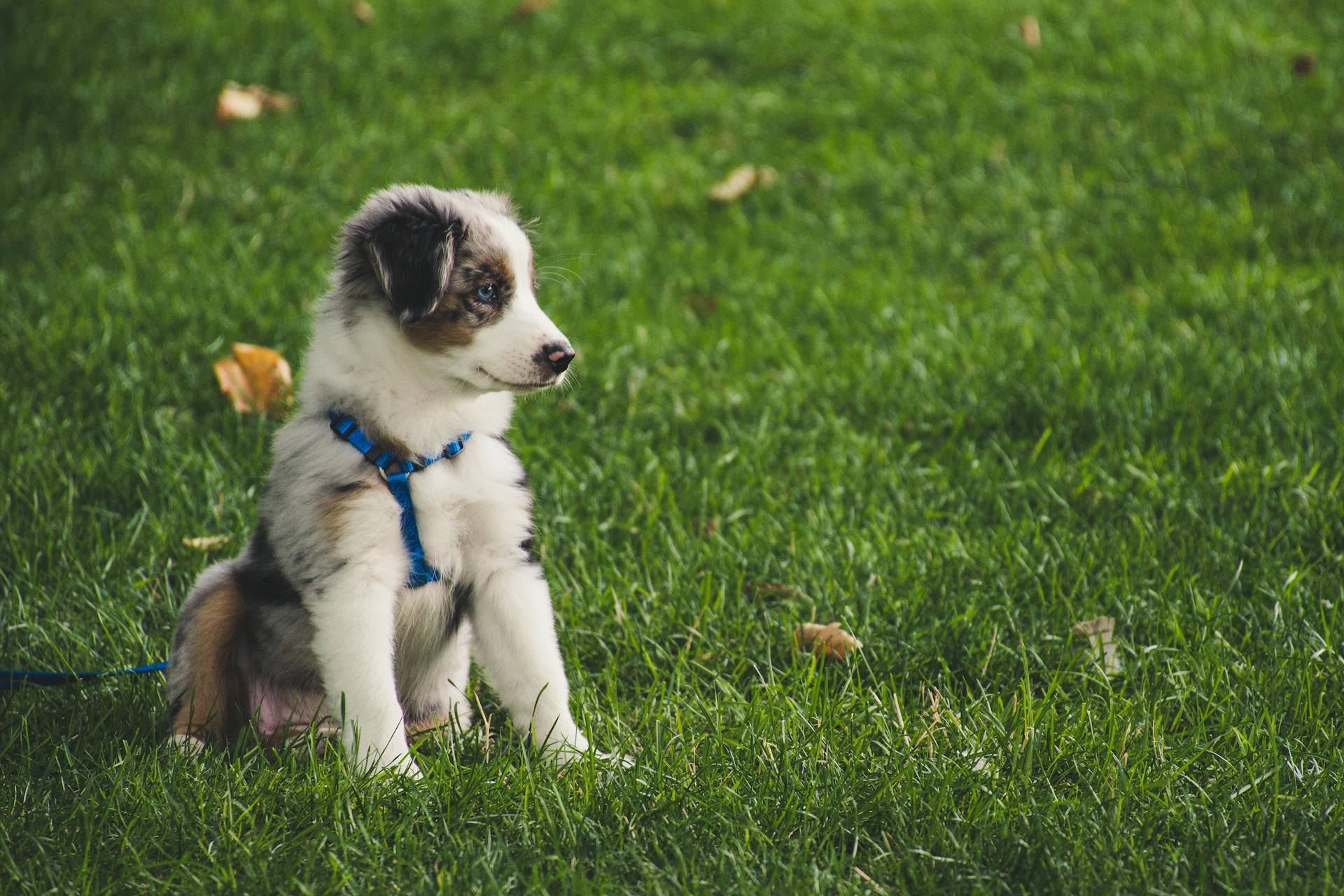
Australian Shepherds are highly intelligent dogs that thrive on mental and physical stimulation, making them a great breed for active owners.
Australian Shepherds are naturally herding dogs, bred to herd sheep and other livestock, and this instinct remains strong in the breed today.
Their high energy levels require regular exercise and training to keep them happy and healthy.
In fact, Australian Shepherds need at least 1-2 hours of exercise and mental stimulation per day to prevent boredom and destructive behavior.
With the right training, Australian Shepherds can excel in a variety of dog sports, including agility, obedience, and herding competitions.
Explore further: How Much Exercise Do Border Collies Need
Getting Started
Socializing your Australian Shepherd at an early age is crucial for its development. Take your dog to various places where it can interact with different people, showing it that strangers and new places are fun experiences.
Practice reward-based training principles, such as positive-reinforcement training, which motivates the dog to complete desired behavior by giving praise or rewards.
Consider clicker training, a type of training that uses a sound to indicate to the dog when a command has been completed.
To start training, begin with simple commands like "sit" and "stay", and use your hands to guide the dog's movements.
Keep training sessions short, around 15-20 minutes, and work on a variety of commands.
Here are the essential steps to get started:
- Start with simple commands like "sit" and "stay."
- Use your hands to guide the dog's movements.
- Keep training sessions short, around 15-20 minutes.
- Work on a variety of commands.
Training Basics
Australian Shepherds are smart and energetic dogs that need mental stimulation, so it's essential to exercise both their brain and body from an early age.
To start, teach your Aussie the basics, such as their name, sitting, staying, and walking on a leash nicely. Dr. Timm suggests that Aussies should know their name, basic cues like sit and down, and recalls by the time they're a few months old.
You want to work on basic cues and set rules early on, as Aussies are prone to learning things on their own if you don't teach them what you want them to do. This can lead to confusion and make it harder for them to learn later on.
See what others are reading: Dog Training Basic Obedience Lesson Plan
Here's a simple way to teach your Aussie the "sit" command:
- When your Aussie sits down, give the verbal cue, "sit", and then give your dog a treat with praise.
- Continue this process every time your dog sits.
- Eventually, your Aussie will begin to associate the action of sitting with your verbal cue and will anticipate the treat.
Aussies don't like repetition, so once they've learned a behavior, it's essential to mix things up and not repeat the same action over and over. This will help keep them engaged and prevent boredom.
To perfect the basics with your Aussie, focus on potty training, crate training, and recall by the time they're six months old. At this age, they should be comfortable walking on a leash and responding to basic cues like sit and down.
Consistency and patience are key when training an Aussie. If everyone in the household isn't on the same page, it can confuse your dog and make training more challenging.
Expand your knowledge: Australian Shepard Mini
Socialize Your
Socializing your Australian Shepherd puppy is crucial for their development and behavior. They need to be exposed to new people, places, sounds, surfaces, and dogs.
A well-socialized puppy becomes a kind, friendly, and well-adjusted dog. Dr. Timm advises to socialize them with other dogs that you know are healthy and vaccinated.
Exposing your pup to new environments can be done safely by enrolling them in the AKC S.T.A.R. Puppy program. This program teaches manners and allows your pup to socialize with others.
Make sure your puppy is exposed to a variety of surfaces, such as grass, wood, and tile, to help them become confident and comfortable in different environments.
Additional reading: 6 Week Dog Training Program
Training Techniques
Consistency is key when training your Australian Shepherd. Choose a specific word for each command and always use the same word, tone of voice, and volume. This clear communication will help your dog understand what you want them to do.
Short training sessions are also essential. Aim for 15 to 20 minutes per day, and avoid long, drawn-out sessions that can lose your dog's interest and focus.
Consistency extends to your tone of voice as well. Say commands like "come" with a happy voice, and avoid using a frustrated tone that can confuse your dog.
Take a look at this: How Long Should Dog Training Sessions Be
Reward-based training is a great way to motivate your Australian Shepherd. Use their favorite treats and plenty of praise to encourage good behavior.
Here are some key tips to keep in mind:
Remember, mental and physical exercise are essential for your Australian Shepherd's well-being. Include both in your training routine, and be patient and consistent in your approach.
Advanced Training
Advanced training for your Australian Shepherd should be broken into smaller and achievable sections. Each skill should be taught separately with praise and treats.
To keep your Aussie busy and engaged, consider incorporating herding and agility trials into their training routine. Due to their herding skills, as well as being intelligent and high energy, Aussies thrive in these types of activities.
Consistency is key when teaching your dog new tricks, so be sure to keep using your verbal cues for the older commands you've already taught. This way, they will still remember these older skills and will receive consistent overall training.
If you're concerned about your dog's behavior, don't hesitate to speak with a vet. They can provide personalized advice and help you address any issues that may be arising.
You might enjoy: Pad Training an Older Dog
Get Involved in Activities
Exercise your Aussie's body and mind daily, including both physical and mental exercises. This is especially important when your pup is young.
Dr. Timm recommends teaching your Aussie early learning activities, such as getting in and out of a box, to give them focus and mental stimulation.
Treiball activities are a fun way to engage your Aussie's mind and body, and can be played in your backyard or living room.
Aussies excel in AKC activities like agility, obedience, and herding, which can help channel their boundless energy into something constructive.
Your Aussie will love participating in these activities with you, thanks to their strong bond with their family and high energy levels.
To keep your Aussie's mind and body active, incorporate them into your daily activities, such as scouting the property or helping with chores.
Make it your Aussie's job to round up family members and usher them to the breakfast table, or teach them to bring back toys or find hidden items on walks.
Remember to keep your Aussie's training sessions short and varied to avoid boredom, and always include mental stimulation to keep them balanced.
Explore further: Are Cattle Dogs Good Pets
Growth Stage: Beyond One Year
By one year, your Australian Shepherd puppy should know basic cues, be comfortable being alone, and have a daily routine.
As they mature, your dog will continue to refine these skills and develop new ones. By two years, they should have a solid foundation in obedience and be able to focus on more advanced training.
Your Australian Shepherd's mental and physical growth will slow down, but they'll still need plenty of exercise and mental stimulation to prevent boredom and destructive behavior. Aim for at least 30 minutes of physical activity and 10-15 minutes of mentally challenging activities per day.
As your dog's confidence grows, so will their ability to learn and respond to new commands and tasks. With consistent training and practice, they'll become a skilled and loyal companion.
Take a look at this: Will Getting a Male Dog Fixed Help with Aggression
Expert Insights
Socializing your Australian Shepherd at an early age is crucial for its development. It's essential to expose your dog to various people and environments to help it become confident and well-rounded.
Early socialization can make a huge difference in your dog's ability to interact with strangers and navigate new situations. I've seen dogs that were socialized early become calm and composed in new environments, while those that weren't can become anxious or fearful.
To socialize your dog, take it to various places where it can interact with different people. This can be a park, pet store, or even a friend's house. The key is to show your dog that new people and places are fun and exciting, not scary.
Here are some tips for successful socialization:
- Take your dog to a variety of places, such as parks, pet stores, and friends' houses.
- Introduce your dog to different people, including children and adults.
- Make new experiences positive and enjoyable for your dog.
Reward-based training is another essential aspect of Australian Shepherd training. This type of training focuses on rewarding good behavior rather than punishing bad behavior. By doing so, you can encourage your dog to repeat desired behaviors and avoid unwanted ones.
Reward-based training can be an effective way to train your dog, especially if you use positive reinforcement techniques like clicker training.
A fresh viewpoint: Reward Based Dog Training
Frequently Asked Questions
What not to do with an Australian Shepherd?
Don't leave an Australian Shepherd alone for extended periods without proper care, as this can lead to destructive behaviors or barking. Crate training may be necessary to ensure the dog's safety and prevent unwanted behavior.
How do I calm down my Australian Shepherd?
To calm your Australian Shepherd, use a calm and gentle tone, saying "it's okay" and "relax" to signal the end of work time. This can help your Aussie unwind and calm down within 30 seconds.
Are Australian Shepherd puppies hard to train?
Australian Shepherd puppies are highly trainable due to their intelligence and loyalty, making them a great choice for active families. With their boundless energy, they thrive on engaging activities and respond well to training.
What is the best age to train a Australian Shepherd puppy?
Australian Shepherd puppies can start basic obedience training as early as 7-8 weeks old due to their intelligence and eager learning nature. Early training sets the foundation for a well-behaved and well-adjusted adult dog.
How long does it take to housebreak an Australian Shepherd?
Housebreaking an Australian Shepherd typically takes several months. With consistent training, you can build a strong bond with your dog and enjoy a mess-free home.
Sources
- https://www.certapet.com/australian-shepherd-service-dog/
- https://www.wikihow.com/Train-an-Australian-Shepherd
- https://www.akc.org/expert-advice/dog-breeds/how-to-train-an-australian-shepherd-puppy-timeline-milestones/
- https://www.dogster.com/dog-training/how-to-train-an-australian-shepherd
- https://www.australian-shepherd-lovers.com/dog-training-tips.html
Featured Images: pexels.com

